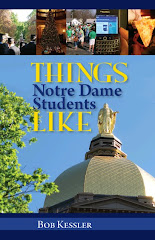During the summer before students begin their freshmen year at Notre Dame, they are randomly assigned to a room in one of the 29 residence halls around campus by the Office of Residence Life and Housing (a.k.a. ResLife). These hall and roommate assignments are based singularly on a person’s gender, and, unlike many schools, have nothing to do with the preferences of the individual students. ResLife’s selection process doesn’t include surveys to match compatibility (something that some students might have to do on eHarmony if they fail to get a “Ring by Spring”) and it doesn’t allow the opportunity to room with high school friends or people that students previously met at ND summer programs. At Notre Dame, freshmen year roommates are selected entirely at random.
These random collections of individuals are one of the main attributes that differentiate dorms from Greek systems at larger universities (see #79). Not only are students not given a chance to choose the dorm in which they will live, but dorms are not given the opportunity to choose which incoming freshmen they want to live in their dorm.* Whatever the computer assigns is what the students and halls are stuck with. In fact, even the process to change dorms after a year is made to be overly difficult for students, meaning they rarely change dorms.
Despite the randomness associated with the system, and the somewhat diverse amount of personalities that exist within each dorm, many dorms have common stereotypes that are associated with them. Alumni guys are arrogant, Sorin guys are pretentious, Howard girls are slutty. According to Notre Dame Students, these collections of randomly-assigned individuals seemingly have a lot in common.
Regardless of whether or not these and other stereotypes are true, they spread by being consistently discussed across campus. Roughly half of the Keenan Revue is dedicated to jokes about how BP girls are fat. Comics in The Observer never fail to miss an opportunity about how nobody lives in Keough or how Carroll guys are weird. Notre Dame Students love to group people together by dorm (see #16).
The most fascinating aspect of these ingrained subcultures manifests itself when members of a dorm embrace their particular stereotype to the point of creating a self-fulfilling, self-perpetuating “dormthink.” This is most clearly demonstrated by the men of Zahm that seemingly take up the mantle of their fake-gayness as soon as they arrive on campus. While individually these men might not act fake-gay at all, as a dorm they collectively perpetuate the stereotype and give the dorm a far different identity than other dorms.
Because of all this, Notre Dame Students love dorm stereotypes. They love the idea that their halls have identities and traditions of their own (see #40), and they love being a part of these communities. Even if individual members of halls don’t display the traits for which they are known, Notre Dame Students embrace the stereotypes to build and perpetuate the communities that they love.
*Generally this is true, but it should be noted that there is a double-secret process by which rectors can pull a handful of specific students (usually younger siblings) into their hall. It is unclear how this process works and how often it is used.


+Fist+Pumps.bmp)




